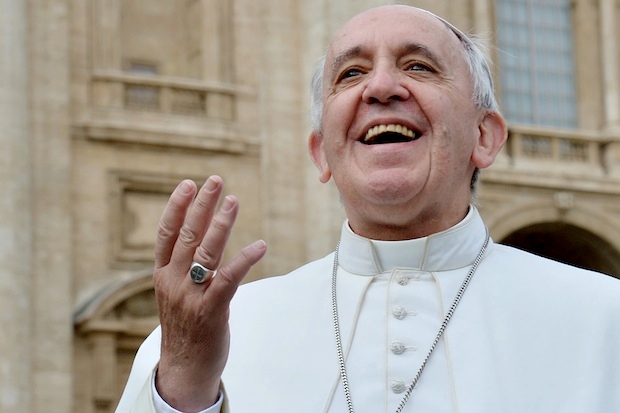It’s filthy wet weather in Tuscany, so I’m lying on my bed in the afternoon reading through the Italian newspapers. They are full of stuff about Pope Francis — how his humility, his simplicity, and his reforming zeal are breathing new life into the Roman Catholic Church. They say that the long decline in church attendance in Italy has been reversed in the few months since a previously little-known bishop from Argentina, Jorge Mario Bergoglio, was elected to the papacy. His public appearances at the Vatican are also drawing enormous crowds. He is, in short, a superstar, and by no means in Italy alone. Everywhere in the world, including Britain, lapsed Catholics are flocking back to church. And even among non-Catholics on the left, his popularity is huge. In last Saturday’s Guardian, the self-confessed atheist Jonathan Freedland wrote passionately in his praise. The Pope’s personal modesty, he said, conveyed ‘a powerful message of almost elemental egalitarianism’; and he was now ‘the world’s loudest and clearest voice against the status quo’. ‘You don’t have to be a believer,’ said Freedland, ‘to believe in that.’
Well, I was lapping up this stuff when I chanced upon an article in Corriere della Sera by a well-known Catholic writer, Vittorio Messori, which sounded a note of warning about this papal idolatry. This, he said, was ‘reawakening an ancient and recurrent myth among Catholics — a dream, that is, of a return to the early Church, all poverty, brotherhood and simplicity, without hierarchical structures or canonical laws’; a dream of ‘a slimmed-down, democratic Church’ in which there would be no Vatican, no Curia, no banks or diplomats but ‘a return at last to the community of Jerusalem after the Pentecost’.
Messori quickly pointed out that the Church had never been like that; that even in its earliest days it had featured bitter struggles between factions, mutual accusations of heresy, schisms, even violence: ‘But the recurrent nostalgia, which now seems to have sprung up again, for a Church that was once egalitarian and poor, where faith was free of superstructures, not only contradicts the evidence of history but also an implacable law by which great social realities born out of “movements”, usually launched by one charismatic personality, quickly dissolve and disappear for ever unless they are transformed into hierarchical institutions, with solid and orderly structures.’ If the ‘Movement of Christ’ had not become a solid institution, Messori concluded, ‘it would have remained but a footnote in some ancient Hebrew historical text’.
It seems natural that many Catholics, disgusted by the recent scandals in the Church, should nurture such unrealistic dreams; and Pope Francis, with his apparent contempt for bureaucracy and petty regulation, seems to encourage them. But there is clearly a danger that he will never be able to meet their expectations, and that the current high hopes of him will turn to disappointment. And the same kind of scenario exists in the field of Italian politics. It was understandable, after Silvio Berlusconi’s abysmal failure over many years to deliver the stable, uncorrupt, cleaned-up political system that he had promised voters, that they should have shown their disgust by voting in astonishing numbers for a new party, led by a TV comedian, Beppe Grillo, whose only motivation is contempt for all politicians and whose only programme is to frustrate them in whatever they want to do. Unless Grillo’s ‘Five Star Movement’ assumes responsibility for something, it cannot last for long.
If Berlusconi failed completely in his original aim, which was to draw all the centre-right groups in Italian politics into one united party to confront the left, it was because he, too, failed to build a durable institution. This was not because of any misguided egalitarianism on his part, but because, on the contrary, he could not conceive of an institution with any leader other than himself, or with any purpose other than the promotion of his own business interests or the protection of his person from the reach of the law. He is in his late seventies now, but has refused to look ahead to his party’s future without him. In fact, it seems that he cannot imagine such a thing. So it’s not surprising that many of his followers in parliament have now deserted him, rather than share the fate of a doomed old man. It is not much of a record for a man who has governed Italy for longer than any leader since Mussolini.






Comments